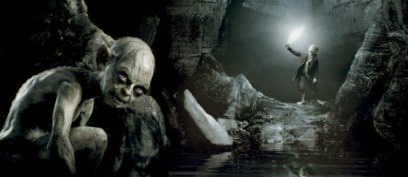
.
No
Mere Mortals
.
by
C.S. Lewis
It may be possible for each to think too much of his own potential glory
hereafter; it is hardly possible for him to think too often or too deeply
about that of his neighbor. The load, or weight, or burden of my neighbor’s
glory should be laid daily on my back, a load so heavy that only humility
can carry it, and the backs of the proud will be broken.
It is a serious thing to live in a society of possible gods and goddesses,
to remember that the dullest and most uninteresting person you can talk
to may one day be a creature which, if you saw it now, you would be strongly
tempted to worship, or else a horror and a corruption such as you now meet,
if at all, only in a nightmare.
All day long we are, in some degree, helping each other to one or other
of these destinations. It is in the light of these overwhelming possibilities,
it is with the awe and the circumspection proper to them, that we should
conduct all our dealings with one another, all friendships, all loves,
all play, all politics. There are no ordinary people. You have never
talked to a mere mortal.
Nations, cultures, arts, civilizations -these are mortal, and their
life is to ours as the life of a gnat. But it is immortals whom we joke
with, work with, marry, snub, and exploit –
immortal horrors or everlasting splendors.
This does not mean that we are to be perpetually solemn. We must play.
But our merriment must be of that kind (and it is, in fact, the merriest
kind) which exists between people who have, from the outset, taken each
other seriously –
no flippancy,
no superiority, no presumption. And our charity must be a real and costly
love, with deep feeling for the sins in spite of which we love the sinner
–
no
mere tolerance, or indulgence which parodies love as flippancy parodies
merriment. Next to the Blessed Sacrament itself, your neighbor is the holiest
object presented to your senses. If he is your Christian neighbor, he is
holy in almost the same way, for in him also Christ vere latitat–
the
glorifier and the glorified, Glory Himself is truly hidden.
[quote from The Weight
of Glory, by C.S. Lewis. Lewis delivered this sermon at Oxford University
Church of St. Mary the Virgin, on June 8, 1941. It was originally published
in January, 1942.]
Clive
Staples Lewis (1898 – 1963), commonly referred to as C. S.
Lewis and known to his friends and family as Jack, was an Irish-born British
novelist, academic, medievalist, literary critic, essayist, lay theologian
and Christian apologist. He is also known for his fiction, especially The
Screwtape Letters, The Chronicles of Narnia and The Space Trilogy.
Lewis
was a close friend of J. R. R. Tolkien, and both authors were leading figures
in the English faculty at Oxford University and in the informal Oxford
literary group known as the "Inklings". According to his memoir Surprised
by Joy, Lewis had been baptised in the Church of Ireland at birth,
but fell away from his faith during his adolescence. Owing to the influence
of Tolkien and other friends, at the age of 32 Lewis returned to Christianity,
becoming "a very ordinary layman of the Church of England". His conversion
had a profound effect on his work, and his wartime radio broadcasts on
the subject of Christianity brought him wide acclaim. |